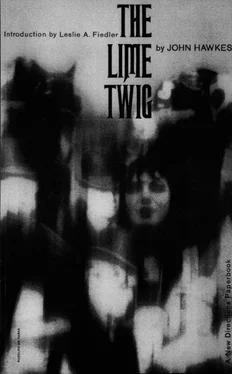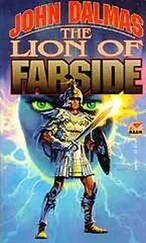Kissing, noise, and singing: a late hour in the widow’s parlor, and Banks saw Sparrow wave, watched Sybilline sit on the arm of Little Dora’s chair and swing her foot, and noticed that the widow was keeping her eye on him. Plump, wearing the tasseled shawl, she suddenly leaned over Syb and the slouching woman, and after a moment Dora jerked round her head and stared at him. Then all three were laughing — even his own dear girl — and he started toward them, took a place at the jockey’s side.
A barracks song was coming from the coffin box of the piano, old, fast-stepping. A golden mermaid stood holding a pitchfork on the ebony and she was bounded by wreaths, her fishtail curved over her head. Scars and finger-length burns marked the ebony, ivory was missing from the keys. Banks leaned against the trembling wood, and there was a pile of tattered sheet music ready to fall from the top and he had never heard such noise. Yet Larry went on talking — audibly enough, considering— and the jockey was nodding and beating upon the last key of the scale.
"… And I told the Inspector he was making a horrible botch of it. I said it would never do. Who’s pulling the strings I told him and he got huffy, huffy, mind you. I said the killing of the kids was no concern of mine but the hanging of Knifeblade was not acceptable, not in the least acceptable. You’d best not interfere, I said. There’s power in this world you never dreamed of, I told him. Why, you don’t stand a showing even with a little crowd at the seaside … and you’d better not bother with my business or my amusements. …”
“But didn’t he try to stick you none the same,” said the jockey.
“He did, but he failed. I knew him in Artillery, I knew his line. …”
Banks listened, looked at the white craven half of his face, the slicked black hair, the fingers hammering. He saw the man lift the bottle several times to his lips.
The jockey’s sleeves were puffing out, the small black boots were hanging limp, one hand snatched down the goggles and through isinglass he peered at the single key and at the two gray fingers he was striking it with— a rider who had a face shot full of holes and shoulders like the fragile forks of a wishbone on either side of the hump inside the silk. Banks put a sheet of the music on the rack and said, “Play us this piece, Needles. …” But the jockey did not reply.
There was a fire in the kitchen and it was Sybilline who told him to take the chair—“Don’t you know what eggs are good for, Michael?”—and stood near him with her smile and the flush creeping up her cheek. They formed a regular crew: his Syb, the widow, the other one who looked as if she wanted to fight. Syb’s throat was bare, the widow had plump hips and she was giggling. He could smell them: above the heat and moisture of the fire, the spice and flour odors of the laden shelves, the sweetness of old tarts and bread, he could smell the women strongest. And Sybilline kissed him immediately — leaning over, putting her face into his and her hand upon his neck — so that the other two could see. Still with mouths together, he found her breast for a moment and opened his eyes, saw the widow smiling — but it was a smile set and strained as if she could hardly keep from offering advice — and the other woman was smiling and Banks didn’t care.
“Get out of here, Sparrow,” the widow said all at once and looked down at him, became dimpled and rosycheeked again. Then Syb left him, stepped away with her compassionate mouth dissolving, becoming part of a pretty face again, and he could think of nothing except the stocking she had left upstairs — though they were roughing it in the parlor next to the kitchen and flinging about, dancing with the widow’s girl, intent, all of them, on a smashing.
“Now, Mike, you’ll have to eat,” she murmured, and put a hand to her escaping loop of hair.
“But you been cheating, Sybilline,” the widow said then, “you been going out of turn. The lady of the house has first prerogative and you been spoiling the order, Sybilline — if you please — you ain’t been allowing me my prerogative.” The little woman, youthfully plump except in the legs — she was standing on wiry, wellshaped legs — was preoccupied: it may have been she alone he smelled.
“Syb’s always been a cat,” said Little Dora, “first at the fellows, first in bed. She’s a sister of mine but she’s irresponsible, she is.” And Banks could tell that this one, a fighter with her violet shadows and loosened boots, was interested: but probably she’d want to kill him first. There were no smiles behind those thick corrective spectacles.
“Well, Syb can do the cooking then,” said the widow, and sat down beside him.
“I’ll cook, I’d do anything for Michael!” There was the light step, the grace, the cheer, as she tossed her head and reached for the pan and the bowl of pure-white oval eggs. She got the butter on her fingertips and licked them, her blouse was untucked again and he could see the skin; the eggs were pearls and she was cracking the white shells with her painted nails. The widow was lighting a cigarette. Though he was watching Syb, he found that he was stroking the little widow’s cheek and coming to like her in the kitchen with no one, except these three, to notice.
Beyond the half-opened door the parlor crowd sang “Roll Me Over in the Clover” and the name of Jimmy Needles was screamed out several times. But the women round him seemed not to hear; he hardly heard himself; the women were ganging up on him, doing a job on him. All three were noticing and he tried to pay no attention. They watched him eat. All three were smiling and taking his measure and he didn’t mind. It was Sybilline who made him use the sauce.
“Here,” reaching, tilting the thin brown bottle, “meat sauce is fine on fried eggs, Michael … didn’t you know?”
The smell of the women — girlish, matronly — and the smell of the meat sauce were the same. As soon as it spread across his plate it went to his nostrils and they might not have bothered with their clothes, with procrastination. He kept his face in the plate and kept lifting the fork that had one prong bent, a prong that stuck his tongue with every mouthful. Brown and broken yellow, thick and ovarian, his mouth was running with the eggs and sauce while the whisky glasses of the women were leaving rings.
“Fetch him a slice of bread, Sybilline, he don’t want to leave none of it on the china. …”
He shut his eyes and did not know whose hand it was, but the hand closed in a grip that made him slide forward on the chair and groan.
“You girls wait for me,” said the widow in a voice he could hardly hear. Then: “You’re a charmer, Mike!” and Sybilline was blowing him a kiss.
With his hands in his pockets, shirt collar open about the windpipe and the two muscles translucent at the back of his skinny neck, frowning and keeping his head down, he followed the swinging shawl into the din, the smoke, the noise of the piano that seemed to be playing on the strength of a grinding motor inside the box, though Larry and the jockey were still side by side on its bench. The widow stopped to fix her daughter’s skirts and he bumped against the softest buttocks he had ever known, and apologized.
“I could love you right here,” she whispered, “I really could. …”
He knew that. It was not the place for him exactly, but there was the sauce all over his lip and he thought that in another moment almost anywhere might do.
They reached the stairs in time. The corner turned, the hat tree with its multiple short arms thrust out in shadow, the carpeting, the widow’s rail, the dust and orange bulb — suddenly the bedchambers were near and he was climbing. Up how many times, how many times back down. And it was merely a matter of getting up those stairs, and taking the precautions, and tumbling in, shagging with the widow as the night demanded. He saw her at the top for a moment; stumbled and paused and, clutching the rail, stared, while beneath the bulb she stood squeezing the tiny plump hands together.
Читать дальше












